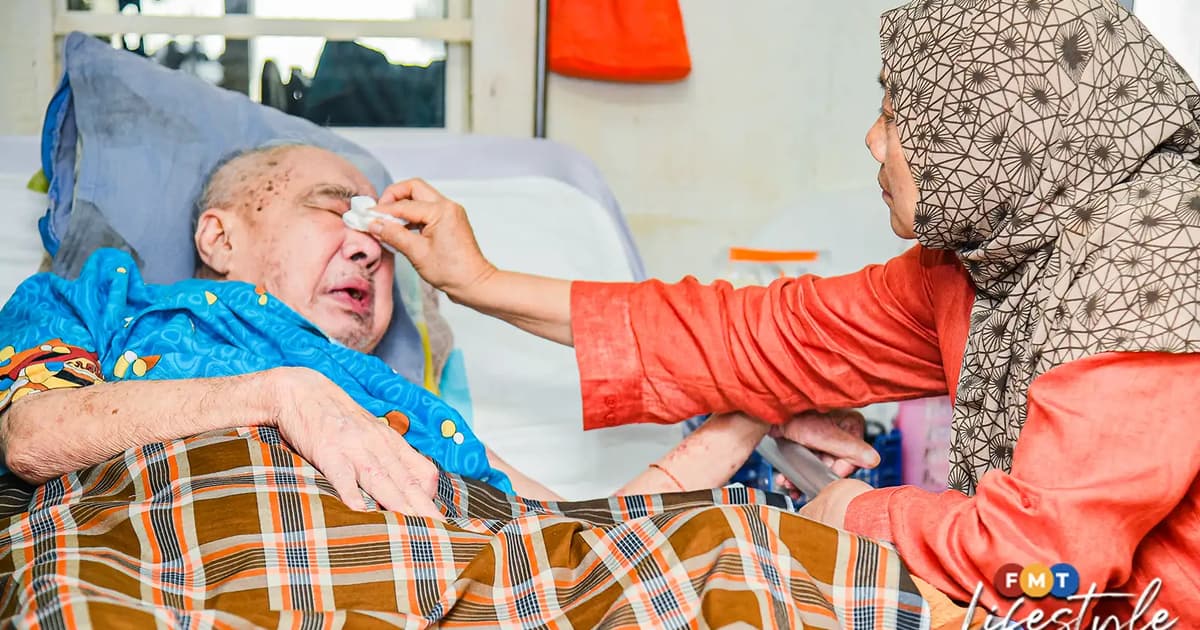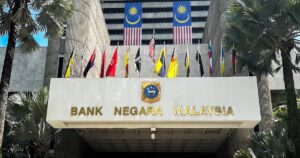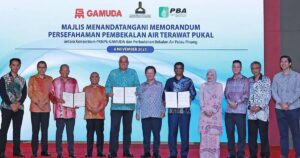
The door to the modest home opened to the soft hum of a fan and the sound of careful footsteps.
Inside, sunlight fell across a living room lined with cups, medals and fading photographs — mementoes of a life once lived at racing speed.
And there, on a bed by the window, lay the man whose legs once powered Malaysia’s earliest dreams on two wheels, now stilled after six years confined to bed.
When two former sportswomen of the year — Zaiton Othman and hurdler Noraseela Khalid, now president of the Malaysia Olympians Association — stepped into the room, Joe Ng Joo Pong’s face lit up.

His right hand, thin and trembling, reached out slowly.
“Zai… Zaiton,” he said, the words faint but full of recognition.
Tears welled in his eyes. The 80-year-old Olympian, bedridden but alert, had waited for this visit.
When Noraseela handed him an Olympic pin and a framed citation from the World Olympians Association — honouring him with the post-nominal title OLY — his fingers lingered on them, tracing the edges slowly.

For a moment, the room was still. Then his eyes caught a photograph on the wall — a much younger version of himself in Mexico, smiling beside a woman athlete.
His face softened, and then came a flicker of mischief. “Pretty,” he said, and the room broke into laughter.
It was a small moment, yet it brought back the same sparkle that once carried him through thousands of miles on the road.
Riding from Brickfields to the world
Long before strokes and slow speech, Joo Pong was the boy who couldn’t stay still.
As a teenager, he helped his family run a small water supply business at 4th mile, Old Klang Road in Kuala Lumpur.
He was in charge of the pump that sent well water to every home in a village from 6am to 6pm for RM6 a month.
The well stood far from their home, so he often borrowed his father’s bicycle without permission — and got a beating for it.
That stubborn love for the bicycle never left him. In the late 1950s, he pedalled through Brickfields traffic on a China-made bike he had earned by selling 60 raffle booklets at school.
The prize — a RM75 bicycle — changed everything.

He came from a family of 17 children. Their father, Swee Long, a stern but loving businessman, saw potential in his sons and turned weekend rides into ritual.
He would trail them in his car along Jalan Kuchai Lama, ensuring their safety as they trained.
When the brothers won a race, he treated them to cow’s milk in Brickfields. When they lost, they rode home in silence.
By 17, Joo Pong was outracing national champions. A year later, at the Asian cycling championships at Merdeka Stadium, he won bronze in the 1,000-metre individual time trial.

He went on to claim gold in the four-man 1,600-metre grass track team trial event with Conrad Talalla, Andrew Michael and Jallaludin Yusof — a victory that still brings a glint to his eyes.
His parents, once wary of his obsession, saved RM270 to buy him a proper racing machine from Robinsons.
That bicycle carried him to the 1964 Tokyo Olympics — Malaysia’s first cycling representative on the world stage — and four years later, to Mexico City.
He retired from competition after the 1970 Asian Games in Bangkok, where both he and his brother Joo Ngan represented the nation.
By then, the younger Ng had emerged as a powerhouse, winning Asian Games gold and becoming Malaysia’s sportsman of the year.
Cruel fate struck in April 1969. During a routine morning road drill, their father — driving behind to keep watch — was killed in a collision with a lorry.
The tragedy shattered the brothers. “He was the one who made us ride,” said Joo Ngan. “When we lost him, it took months before we could get back on the bike.”
In 2010, another blow came when their close friend and fellow cycling great, Daud Ibrahim, died in a road accident near Rembau.
“That broke us again,” said Joo Ngan, 79.
Life beyond the track
Long after the cheers faded, Joo Pong stayed close to the road — this time behind the wheel of a taxi.
He obtained his licence only after then public enterprises Minister Nazri Aziz read about his plight in M Veera Pandiyan’s column “Along the Watchtower”.
“I’m indebted to the reporter and Datuk Seri Nazri for assisting me,” Joo Pong said at the time. His first taxi was written off in an accident, but he later managed to buy another and drove part-time for over a decade.
Nazri, a sports enthusiast, remembered being moved by Joo Pong’s letter. “I knew of the Ng brothers’ exploits,” he said when they finally met in 2012. “They made us proud.”
A room full of history
The living room in Joo Pong’s home is more than a space — it’s a museum of a life lived in motion.
Rows of trophies gleam behind glass; medals hang like frozen applause.
Faded photographs show the young man in a national jersey, head down, legs pumping through rain and sun.
Each object is a conversation starter, a fragment of Malaysian sporting heritage.
As Zaiton and Noraseela moved among them, their laughter softened into awe. “It’s like walking through the pages of Malaysian sport,” Noraseela said.
For both Olympians, the visit was humbling. “These are the athletes who built the road we now run on,” said Zaiton. “We just followed their path.”
The spirit still pedals
Joo Pong listens more than he speaks now. His sentences come slowly, some words replaced by gestures or a raised eyebrow.
But his eyes — alert, shining — still speak volumes.
When Noraseela asked if he missed cycling, he smiled faintly. “Always,” he said after a pause.
The two women sat beside him for nearly an hour, listening to fragments of stories that drifted between laughter and silence.
They left with moist eyes, promising to return soon.
“This visit healed more than one heart,” Noraseela said. “We came to honour him, but he reminded us why we fell in love with sport in the first place.”

A legacy remembered
When they were gone, Joo Ngan adjusted his brother’s blanket and placed the Olympic citation on his chest. The old cyclist’s hand rose weakly to touch it again.
Through the window, sunlight danced across the trophies — the glow of a life that once blazed down open roads.
On the wall outside, his name caught the evening light: Joe Ng Joo Pong — Tokyo 1964 | Mexico 1968.
Inside, the man behind those words lay smiling, his eyes soft with memory.
And in that stillness, it felt as if the road, the wind, and the glory had quietly come home to him again.






